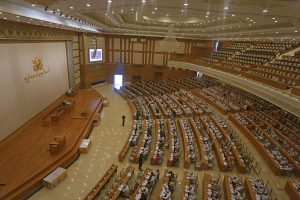The past year has been an unusually difficult one for opposition lawmakers across Southeast Asia, who have experienced a sharp increase in threats and harassment, a new report from the advocacy group ASEAN Parliamentarians for Human Rights (APHR) claims.
“Across Southeast Asia, parliamentarians are increasingly at risk,” the group stated in its annual report. “Lawmakers who use their mandates to defend human rights or to hold power to account have for years been targeted through trumped-up criminal charges, threats and harassment, physical violence, and detention.”
APHR claims that the number of parliamentarians, or MPs, detained in Southeast Asia has dramatically risen over the past year, from just one in 2020 to 91 in 2021. The majority of the detentions have resulted from the disastrous military coup in Myanmar, which saw the ousting of the elected National League for Democracy (NLD) government, the immediate suspension of parliaments at the national, regional, and state level, and the sweeping arrests of dozens of elected parliamentarians including State Counselor Aung San Suu Kyi.
The army’s seizure of power has “plunged Myanmar into another human rights crisis,” characterized by violent dispersal of unarmed protesters that have claimed at least 1,300 lives, in addition to mass arrests. According to APHR, at least 90 parliamentarians from the NLD remained in detention or under house arrest in Myanmar as of last month. “Lawmakers were almost immediately faced with criminal charges, and by the time of publication at least 90 parliamentarians national, regional, and state level remain in detention or under house arrest,” the report states. “Many others have gone into hiding to avoid the same fate.”
Of these, at least six MPs have so far been sentenced to prison, while in the other cases trials – deeply deficient from a legal standpoint – are either underway or pending. As a reminder of the horrific conditions in Myanmar’s prisons, and the brutal treatment of some post-coup detainees, at least one MP has died since his arrest: Nyunt Shwe, a member of the Bago regional parliament, passed away on August 16 having contracted COVID-19 in prison.
“With torture rife in detention, lawmakers and others detained are at serious risk of torture or other ill-treatment, as has been recently highlighted in media reports on the use of torture,” the APHR report stated. “The lack of adequate medical care in Myanmar, in particular in prisons, is also an enormous concern, with the COVID-19 pandemic spreading without an adequate government response.”
At the same time, the security forces have kept up their search for dozens of civilian leaders, who have scattered into hiding since the coup, many of whom have joined a National Unity Government (NUG) that is seeking to resist the junta and win international legitimacy for its struggle against the military. According to APHR, security forces have in some cases targeted the family members of MPs, including children, in order to flush them out of hiding.
While Myanmar’s travails have attracted the most international attention, the situation elsewhere in Southeast Asia has shown little improvement from last year, when APHR reported that “governments in the region have been targeting opposition lawmakers as part of their broader attempts to suppress dissent and attain unchecked power.”
In Thailand, the government of Prime Minister Prayut Chan-o-cha, who led his own coup in 2014, continues to level “trumped-up criminal cases” against members of the opposition Move Forward Party (MFP). The MFP is the latest iteration of Future Forward, a party that was disbanded by a court ruling in early 2020, after scoring threatening gains at elections in March 2019.
The report stated that in Thailand, “opposition MPs were the target of widespread abuse online, often through highly coordinated ‘information operations’ orchestrated by state-affiliated actors,” much of which included “highly misogynistic elements” directed against woman MPs.
In Malaysia, APHR accused the government of former Prime Minister Muhyiddin Yassin of using the COVID-19 pandemic as a pretext to impose a state of emergency, which allowed the suspension of parliament for more than seven months. It said that Muhyiddin’s “backdoor government,” which assumed office in March 2020 amid political maneuvering and governed until Muhyiddin’s resignation in August, had been marked by “a wider crackdown on freedom of expression.” This involved the legal harassment of opposition MPs who spoke out against the suspension of parliament and on other human rights issues.
Meanwhile, in the Philippines, ongoing campaigns against left-leaning parliamentarians have “intensified during the build-up to Presidential, Senate, and House of Representatives elections taking place in 2022.” Prominent among the approaches is the “red-tagging,” accusations of individuals having ties to armed left-wing groups, which expose them to violent attacks.
Although not featured in detail in the report, former opposition lawmakers have also been targeted in Cambodia, where the political opposition has mostly ceased to exist since the government’s dissolution of the popular Cambodia National Rescue Party (CNRP) in late 2017, prompting most of the CNRP’s elected parliamentarians to fly into exile abroad.
According to APHR’s report, the growing attacks against elected parliamentarians was just one subplot in what was “a dark year for human rights in Southeast Asia.” But the group emphasized the important symbolic role of parliamentarians. “Attacks on parliamentarians have lasting impacts on the future space and prospects for political engagement by both constituents and representatives of democratic systems,” it stated.
“An attack on a parliamentarian is an attack on democracy.”

































